This story is syndicated from The Shield, the newspaper of McCallum High School in Austin, TX. The original version of the story ran here.
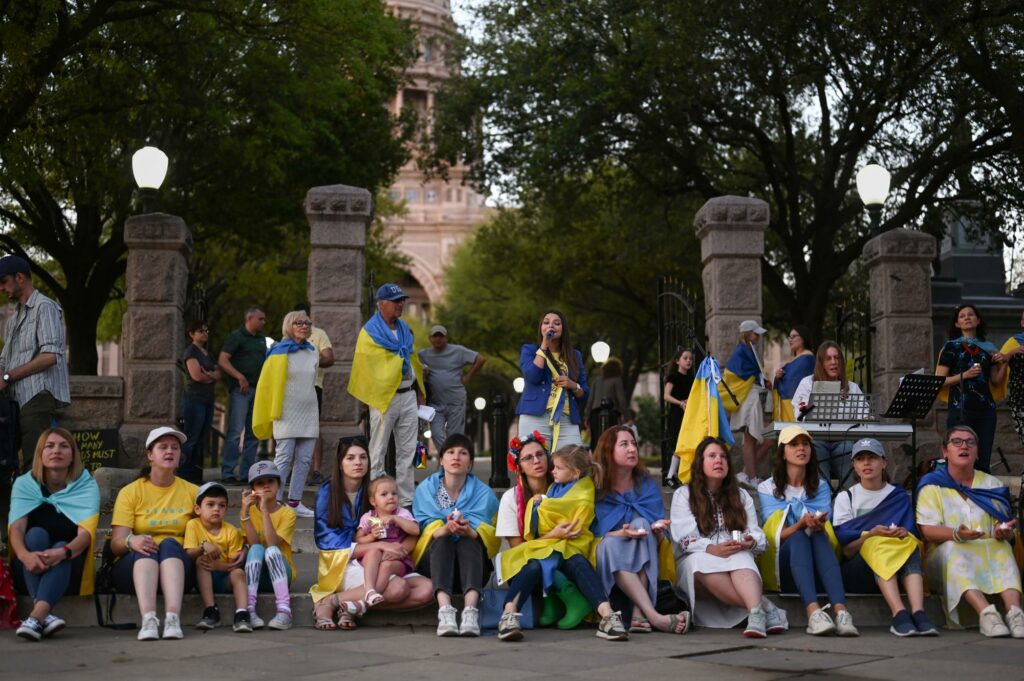
When Russia’s full-scale invasion of Ukraine first began, Americans across the political aisle were united in lending support to Ukraine. Since the beginning of the war, America has given over $75 billion in humanitarian, financial and military support. After the war has stretched on for a year and a half and shows no signs of ending soon, however, things have changed.
There have been calls — most notably by Republican presidential candidate Vivek Ramaswamy — to decrease or stop aid to Ukraine altogether. Media outlets, which used to regularly cover the Austin Ukrainian community’s rallies outside the state Capitol, rarely come anymore. In fact, according to Darya Ledesma, a prominent member of the Austin Ukrainian community who immigrated to the U.S. in 2011, the last time a news outlet covered their rallies was in February, at the gathering marking the first anniversary of the war.
But though American attitudes about the war have changed, one thing has not: the Austin Ukrainian community’s dedication to supporting their home country from afar. Ukrainian activists in Austin have not been deterred from activities such as rallies outside the Capitol and fundraising events.
“We are doing this, and we plan to do this for the foreseeable future,” Ledesma said.
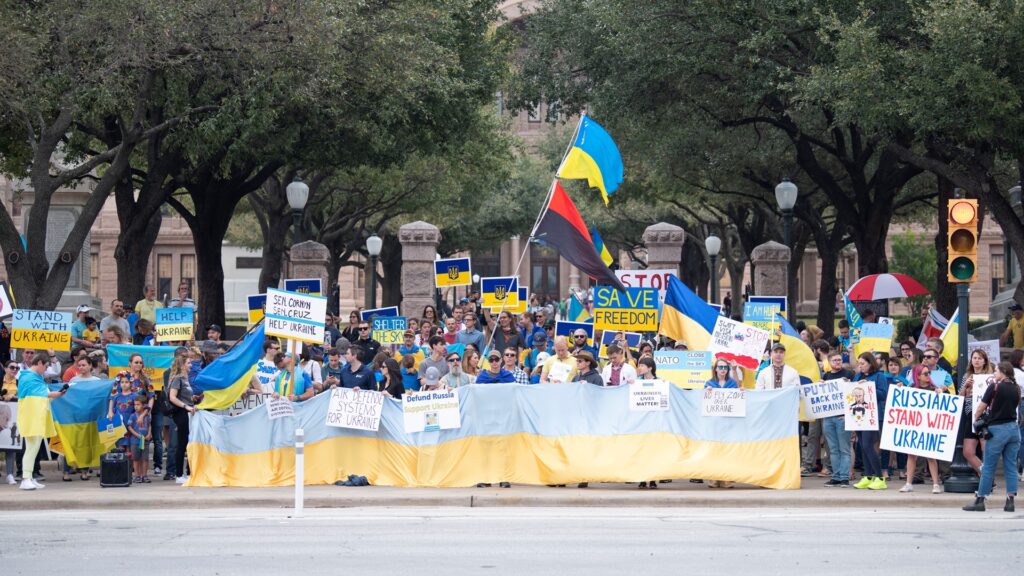
At the war’s outbreak, the community staged daily rallies outside the Capitol to draw awareness to it but decreased them to once a week after about three months. Ledesma, who was previously interviewed by the Shield in the spring of 2022, says that although local media outlets rarely cover the rallies anymore and the number of attendees shifts each week, they don’t plan to stop anytime soon.
“Hopefully, until Ukraine wins, God gives us strength and energy to continue coming to rallies,” Ledesma said.
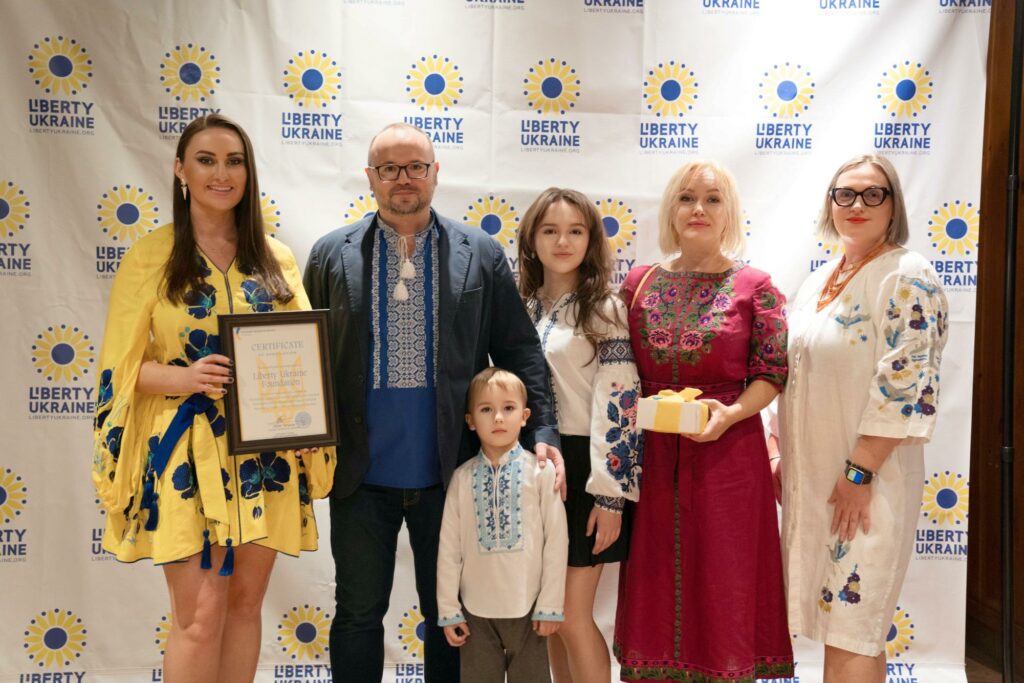
Sending support from overseas
Not only have Austin Ukrainians’ efforts to support their home country remain consistent, but they have also expanded into new areas. In March of last year, Tonya Levchuk and other members of the community established the Liberty Ukraine Foundation, an Austin-based nonprofit dedicated to raising funds for Ukrainian servicemen, first-aid workers and citizens.
“Our goal is to help Ukrainian soldiers stay alive,” Levchuk said.
The nonprofit is working toward this goal by providing medical supplies such as tourniquets and other equipment, such as drones to help in rescue missions, to the frontlines in Ukraine. Other undertakings include fixing vehicles to donate to the frontlines, renovating children’s hospitals to provide both physical and mental support to young patients, and a project called Made In Ukraine, which enlists Ukrainian civilians in sewing thermal base layers for soldiers, allowing them to support the war effort as well as make a living.
“Made in Ukraine is very special for me,” Levchuk said. “My volunteers were sending videos from the factory [where the base layers are made], and I saw how much care and love those workers were putting in this. Because first of all, they were making it for Ukrainian soldiers, which is, for them, helping and supporting. Also, each of them has somebody on the front lines: their husband, their son, their brother, somebody.”
Liberty Ukraine is the reincarnation of a nonprofit organization that Levchuk started in 2014 when Russia forcibly annexed Ukraine’s Crimean peninsula. While Levchuk, who immigrated to the U.S. in 2007, is normally dedicated to her career, she said she has twice switched her priorities and vision for her life: once in 2014, and a second time when Russia invaded again in 2022.
“Helping Ukraine is my top priority in life right now,” Levchuk said. “I literally don’t care about anything else. I do it 24/7. If somebody calls me at two in the morning, that’s a call I’m going to pick up. The rest can wait.”
Ledesma, too, has stayed in a mindset of action over a year and a half. While she has been involved with Liberty, she has also moved on to other areas of need.
“I used to volunteer for Liberty a lot,” Ledesma said. “Liberty is focused on supporting the military, which I am very much in support of myself. But my passion is more toward education and making sure that people in Ukraine learn English.”
To that end, Ledesma founded a nonprofit with a few other Ukrainian-Americans. AHEAD Ukraine, which stands for Advancing Hybrid Education and Development in Ukraine, is committed to rebuilding the Ukrainian education system after many schools were damaged by Russian forces.
“Russia destroyed around 3,200 educational institutions,” Ledesma said. “A lot of the kids won’t be able to go to a physical school this year but are forced to study online in Ukraine. We’re trying to help them by raising donations and purchasing equipment.”
Ledesma and her team have donated English-language books to students to increase English fluency in Ukraine, a skill she views as necessary to exist in the modern world. The group also connects Ukrainian students with American educators who can sponsor them for Ph.D. programs.
“We’re just a team of four people, but we have some people to volunteer and help us,” Ledesma said.
“[We have] a lot of plans, a lot of ideas, but unfortunately, not a lot of time to do more. We want to do a lot more, but all of us have full-time jobs. So that’s just coming out of our free time.”
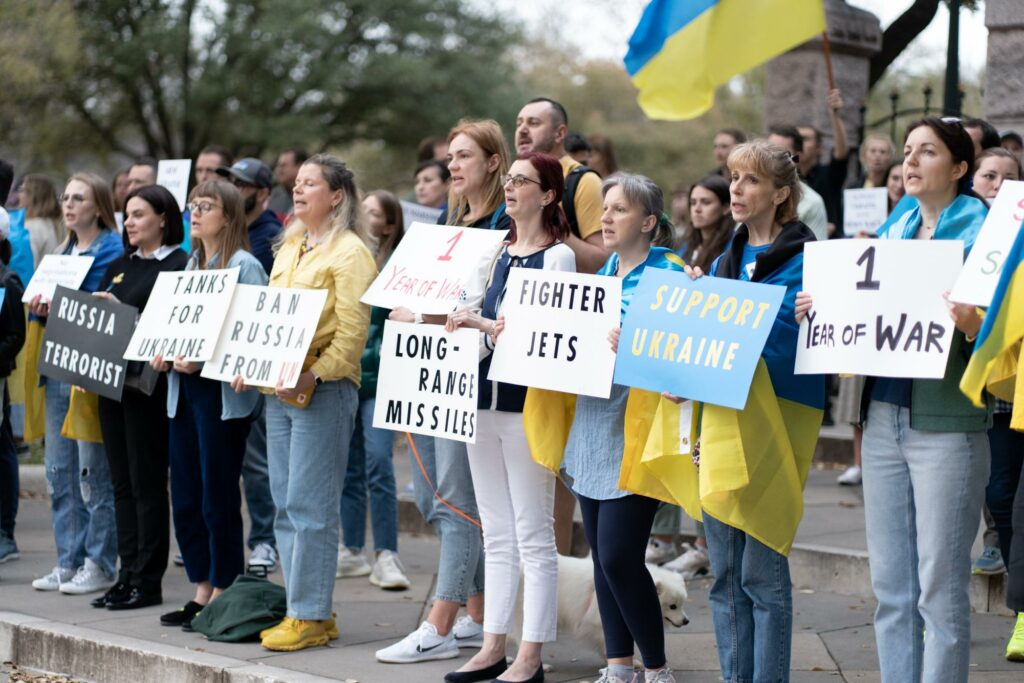
Volunteering action empowers refugees
Kate Voinova, who emigrated from Ukraine over four years ago and was also previously interviewed, is a prominent member of both Liberty Ukraine and the larger Austin Ukrainian community. Like Ledesma, she has family members back in Ukraine — Voinova’s family lives in the Ukrainian capital of Kyiv, an area that has suffered significant damage due to the war.
“I am 100 percent involved in the news and worrying about my family,” Voinova said. “I’m always reading, ‘Where was the rocket?’ and checking if it was not near my mom’s house. I always feel relief when I can confirm it was not near her house. It’s really hard living your life like that because you’re always afraid and expecting bad news.”
Although Voinova is separated from both her family and her country, she says that volunteering with Liberty Ukraine, organizing rallies and even voyaging to Ukraine to bring supplies to the frontlines keep her from feeling powerless.
“You cheer up when you understand that you can do at least something,” Voinova said. “Because living in the United States when this is happening in Ukraine makes you feel so helpless. But when you’re doing something, when you’re staying close to Ukraine and Ukrainian people, it helps [us] a lot to keep going, keep believing, keep waiting for victory to come.”
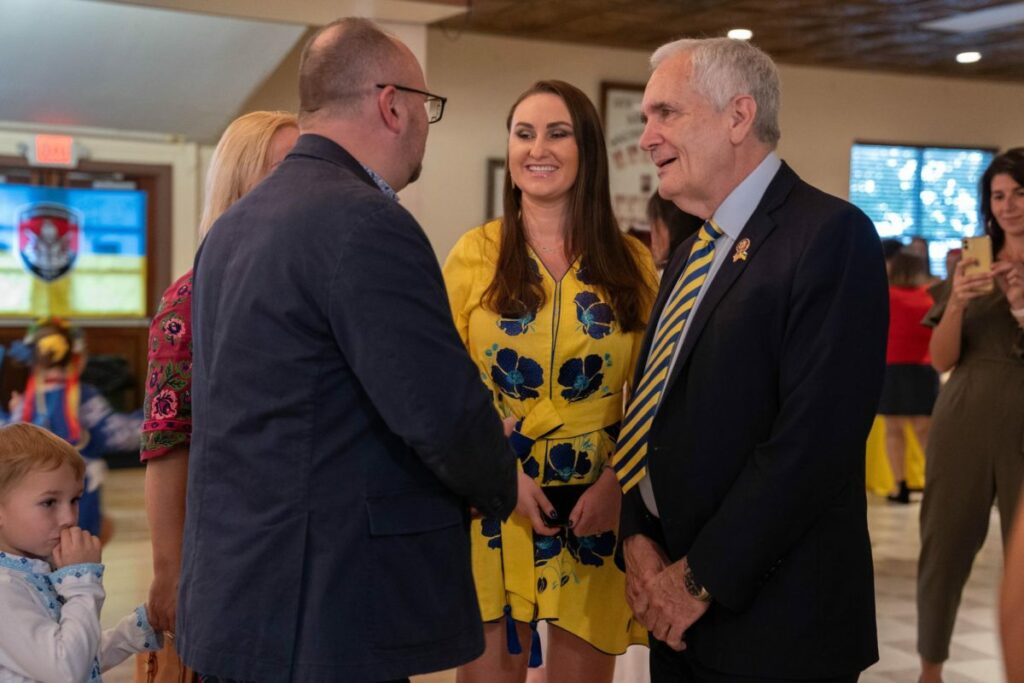
D.C. trip illuminates American desensitization
In addition to their respective nonprofit organizations, both Ledesma and Voinova participated in trips arranged by Ukrainian organizations to Capitol Hill in Washington, D.C. Activists such as Ledesma and Voinova advocate for continued American aid to Ukraine by speaking with U.S. representatives and senators, including Texas senators Ted Cruz and John Cornyn. They traveled to D.C. in March and April of this year and have a third trip planned for October.
“We’re very busy on those trips,” Ledesma said. “Just having meetings, running around Capitol Hill all day long. Those are really nice trips. Last time, we actually were there at the same time as the former president of Ukraine, Viktor Yushchenko. It was so great because we got to meet with him. I got to talk to him and we sang the [Ukrainian] national anthem together.”
Ledesma says that the representatives, senators and staffers she has met with have been generally supportive of their mission and of Ukraine. However, one congressional staffer told her in April that for America to continue providing aid to Ukraine, the Ukrainian summer offensive would have to be “spectacular.”
“The offensive is going well, but it’s going slower than everybody in America is wanting,” Ledesma said. “It felt almost like everybody was waiting on it [to be successful] like some movie with popcorn. But we forget that these are human lives. It’s not a reality show. It’s not entertainment.”
Levchuk feels that American and international aid to Ukraine has been insufficient.
“It’s like the world keeps Ukraine on life support,” she said. “They just give enough to stay alive, but they do not give enough to actually get [the war] to move forward.”
Ledesma shares Levchuk’s sentiment.
“I’m determined to continue asking the legislators to send Ukraine those weapons that it desperately needs,” Ledesma said. “I feel this is just so unfair. If you give somebody something they can succeed with, then yes, you should have high expectations, but when you do not provide the necessary means for that person to succeed, how can you ask for spectacular results?”
Voinova feels that the anti-Ukrainian platforms put forth by some politicians are meant to gain political favor.
“To be honest, I don’t believe that those politicians really think about decreasing Ukraine support,” Voinova said. “I believe this is just a political show. For me, if they have at least a small amount of counselors about geopolitics or historical movements, they will understand what Russia truly is. Russia is opposing itself to Western values and Western freedom. So I just don’t really believe this is a national interest of any country to stop helping Ukraine now.”
Ledesma feels that the change in American attitudes towards Ukraine stems from desensitization to the conflict after a year and a half.
“I think at first there was a shock,” Ledesma said. “We’re used to wars somewhere further away from us, like in the Middle East or other parts. But something like that happening and impacting Europe directly, I think it was a shock. But then naturally, it’s just human nature, the shock passes. You’re just getting used to, ‘OK, another day of war, another 20 people died.’ It doesn’t shock you anymore. It becomes the new norm.”
While Ledesma understands that the conflict isn’t personal to Americans in the same way it is for her, she says the continued aid and attention of the international community is essential to ending the war.
“The way Americans can help is not to have that attitude,” Ledesma said. “If we all bring back our focus or the energy that we had a year ago, we can win this war together. It doesn’t have to be another Afghanistan war, for 20 or 30 years. It can be over quickly and soon. But for that, Ukrainians cannot do the job alone. We’re just not enough people. We need Americans to stay on top of this war.”
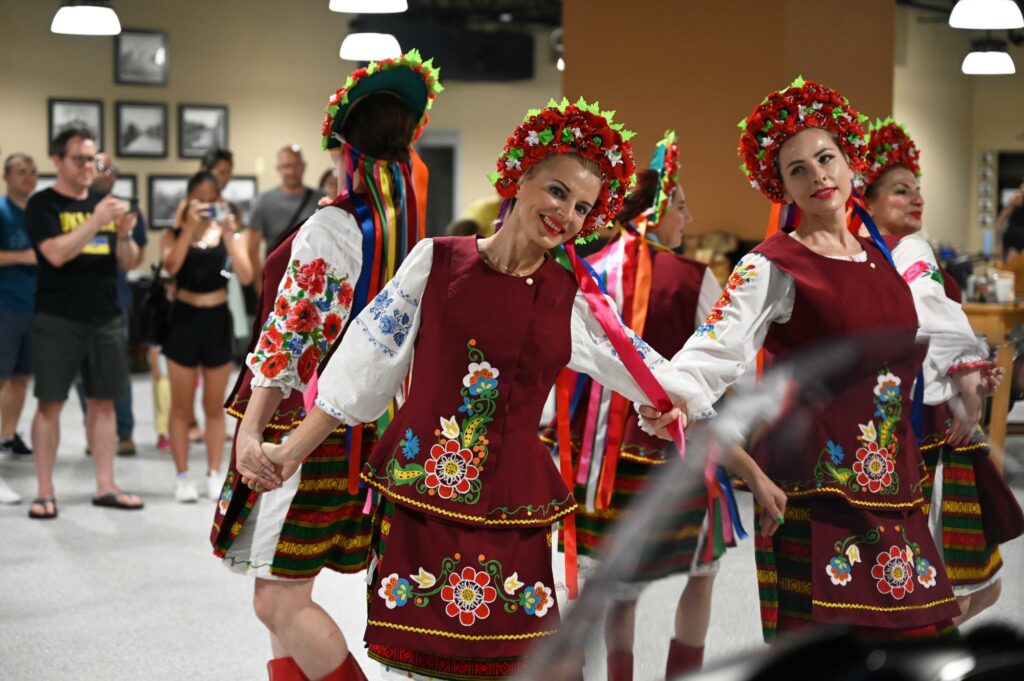
Compassion and community sustain Austin Ukrainian efforts
Ledesma feels the best thing Americans can do to help is not give up on Ukraine. Americans can also support the Austin Ukrainian community by joining their Facebook group attending their rallies and contacting their representatives about keeping Ukraine on their agendas.
The Austin TX Ukrainians Facebook page has grown from around 1,600 members to roughly 5,000 — many of whom, Ledesma says, are Americans. The support for Ukraine she has witnessed from Americans has given Voinova increased faith in humanity.
“People still feel compassion and the pain of my nation,” Voinova said. “This really helps us to feel not alone.”
Ledesma says she is incredibly proud of what the Austin Ukrainian community has accomplished but is also grateful for the efforts of Americans.
“America has become my second motherland,” Ledesma said. “I have always felt so much pride and love for American people. These are such compassionate people who are not thinking just about themselves, as many other nations do. … I don’t think any other nation comes even close.”
But though the three women are grateful for Americans’ support, they each said that being surrounded by fellow Ukrainians is crucial.
“I do have a lot of friends here in Austin, but it’s important for me right now to be with like-minded people,” Levchuk said. “That’s why the Ukrainian community is so important to me because it’s the same pain for all of us.”
Ledesma said that being surrounded by fellow Ukrainians gives her the strength to continue fighting for her country.
“It’s so supportive, I cannot overestimate it,” Ledesma said. “I am so grateful that during this horrible time in Ukrainian history, I’m actually in Austin, where we have an amazing Ukrainian community. … Having all those people, sticking together and being true friends — it helps us all to go through this horrible time. This collective energy energizes you, it gives you hope. And it helps you continue doing what we’re doing, right? Because if we sit and cry and do nothing, how does that help? It does nothing. Never did.”



